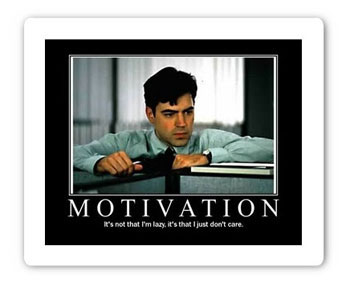You look at the stupidity that happens in your organization and you tell yourself, "WTF! Why cant they see something as clear and stupid simple as this?". And then after a few meetings you stop giving a f@#ck, slip into hibernation and start doing your 'job'.

Scott Berkun describes the situation rather articulately in his post about the topic of fighting management incompetence. He explains:
The big incompetence crime committed by VPs is leaving incompetent managers in place for too long. My theory: by the time the CEO knows a VP stinks, the whole org has known about it for months. The smart people have been making plans to leave or are working to cover their assses. By the time the CEO gets around to taking action, it’s way too late. And often the action taken is whitewashed: no mention is made of how the VP or middle manager utterly failed (e.g. “Fred has decided it’s time for something new.”) The denial lives on, the lie propagates, making it easier for more denials and lies the next time around.
But then the real question that continues to confuse and amuse me is this; why do so many people so high up in the pecking order of really big organizations prefer to live in the state of denial? Are they complete morons, down right idiots or arrogant pompous fools who managed to peck on others and climb the corporate latter of prickdom?
The answer however, might be none of these. John Cleese on his video about creativity might have hit upon the answer using simple science and logic. He explains:
To know how good you are at something, requires the same skills as it does to be good that thing. Which means if you are accidently hopeless at something, you lack exactly the skills that you need to know that you are absolutely hopeless at it.
And this is a profound discovery. Most people who have absolutely no idea what they are doing have absolutely no idea that they have no idea of what they are doing.
It explains a great deal of life. It explains particularly Hollywood. But it also explains why so many people in charge of so many organizations have no idea what they are doing.
They have a terrible blind spot.
And the problem with teachers may be that the teachers do not realize that they themselves are not very creative and therefore they may not value creativity even if they can recognize it.
The approach mostly explains why kickass developers find it painful when they are asked to work with non-technical managers who had never coded or were never really good at coding in their entire life. It also explains why so many people high up in the pecking order of countless organizations around the world do not see what every developer who walks the corridor of the organization sees.
So the next time you are asked to lead a team, work on a project, or lead a department take a long pause and ask yourself if you are really good at what you are going to be leading people on. I know there is an impulsive voice within you dying to say - 'of course I know what I am talking about!' - but hold it. Relax. Give it some soak time. Be really honest about it. What are your credentials on that specific topic?
You might have been an amazing programmer. That does not make you a good manager. You might have been an amazing manager, that will not make you a good entrepreneur. You might have been a really successful entrepreneur, but that that may not make you the best programmer. You might have built an amazing system, that does not make you a person who can drive a community.
Before you decide to get actively involved and lead from the front, think. Sometimes handing the driving wheel to someone else who knows how to drive is a way better option. Seriously.
Comments are closed.